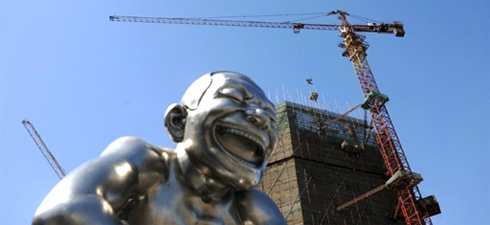China has only just recently earned its status as economic runner-up, barely edging out Japan in production and services in the second quarter. Only the US does better, but Washington shouldn't be resting on its laurels. According to Goldman Sachs, with a projected average growth of 4.25% per year, the American economy will also be obliged to take a step down on the podium by 2027 to make way for China, whose growth over the last ten years has rarely been under 10%. In fact, the country presently performs at nearly one hundred times its 1978 levels in the production and services sectors, which translates to an average growth in excess of 14% per annum. A figure that has raised more than a few eyebrows...
Recalling Japan's example
...and generated much fear. The quip that "God made heaven and earth, and everything else is made in China’" subtly underlines this sentiment. China is presently the largest automotive-industry market in the world: since last year, more cars are sold there than in the United States. And China is also currently the most prolific exporter worldwide, even ahead of Germany.
No one else buys more steel and copper in the international raw materials markets, and it has recently been determined that China also makes use of more petroleum products than any other country. In so many categories, it is running irresistibly to the head of the pack. And if Peking lacks a necessary technology, it will just buy it outright, as in the case of the acquisition of Volvo by Chinese carmaker Geely.
But do we really need to be so afraid? Didn't we already experience the same sort of apprehensions in the 80's, when the Japanese gained tremendous ground in the automotive sector, nearly wiping both the United States and Europe off the map? French and German carmakers, for example, rose to the challenge by stressing their strong points - design, technology and image - while improving on their weaknesses - quality and productivity. The challenge was enormous, but the European brands came out of the fray much stronger than when they were pulled in.
China responsible for third of world’s economic growth
The same thing is presently coming to pass with China, a country that is flooding the entire world with textiles, furniture, electronics, and cheap sports clothing. Their strategy does have its advantages: without China, our T-shirts, running shoes and Apple i-Gadgets would be significantly more expensive. Over the short term, we should just be happy and enjoy the fruits of China's impressive growth, without which the world's economy would again find itself heading toward a dead end. This year, the Organisation for Economic Co-operation and Development (OECD) estimates that China will be responsible for a third of the planet's economic growth.
For now, Chinese production is still quite complementary to that of the West. Items whose production is both simple and labour-intensive will be made in China. But where manufacturing requirements become more complex, production gravitates toward the west. But for how much longer? In a country like China, more new engineers join the workforce each year than in the United States and Europe combined.
A giant with feet of clay
Here is where the greatest difference lies between today's China and the Japan of the 1970's and 80's: there are quite simply ten times as many Chinese as there are Japanese, and this gives the country a much greater potential than any other nation. But we shouldn't become too worried over the question of population, believes Carsten Brzeski of the bank ING, "otherwise, (a smaller country like) Belgium would never have survived among its larger and more powerful neighbours like Germany and France".
For the time being, China is still a giant with clay feet. It was only earlier this year that it rose to take its second-place spot among the world's economies, but it is still one gigantic country. In terms of its GDP per inhabitant, the World Bank ranks it at number 127, behind Angola and Azerbaijan.
We also shouldn't forget that China is still a developing country, which is why economists are somewhat sceptical that it can maintain its runaway growth for much longer. Just last year, strikes here and there resulted in significant salary increases, which are ultimately detrimental to competitiveness and will tend to slow its precious growth rate.
Was this article useful? If so we are delighted!
It is freely available because we believe that the right to free and independent information is essential for democracy. But this right is not guaranteed forever, and independence comes at a cost. We need your support in order to continue publishing independent, multilingual news for all Europeans.
Discover our subscription offers and their exclusive benefits and become a member of our community now!












